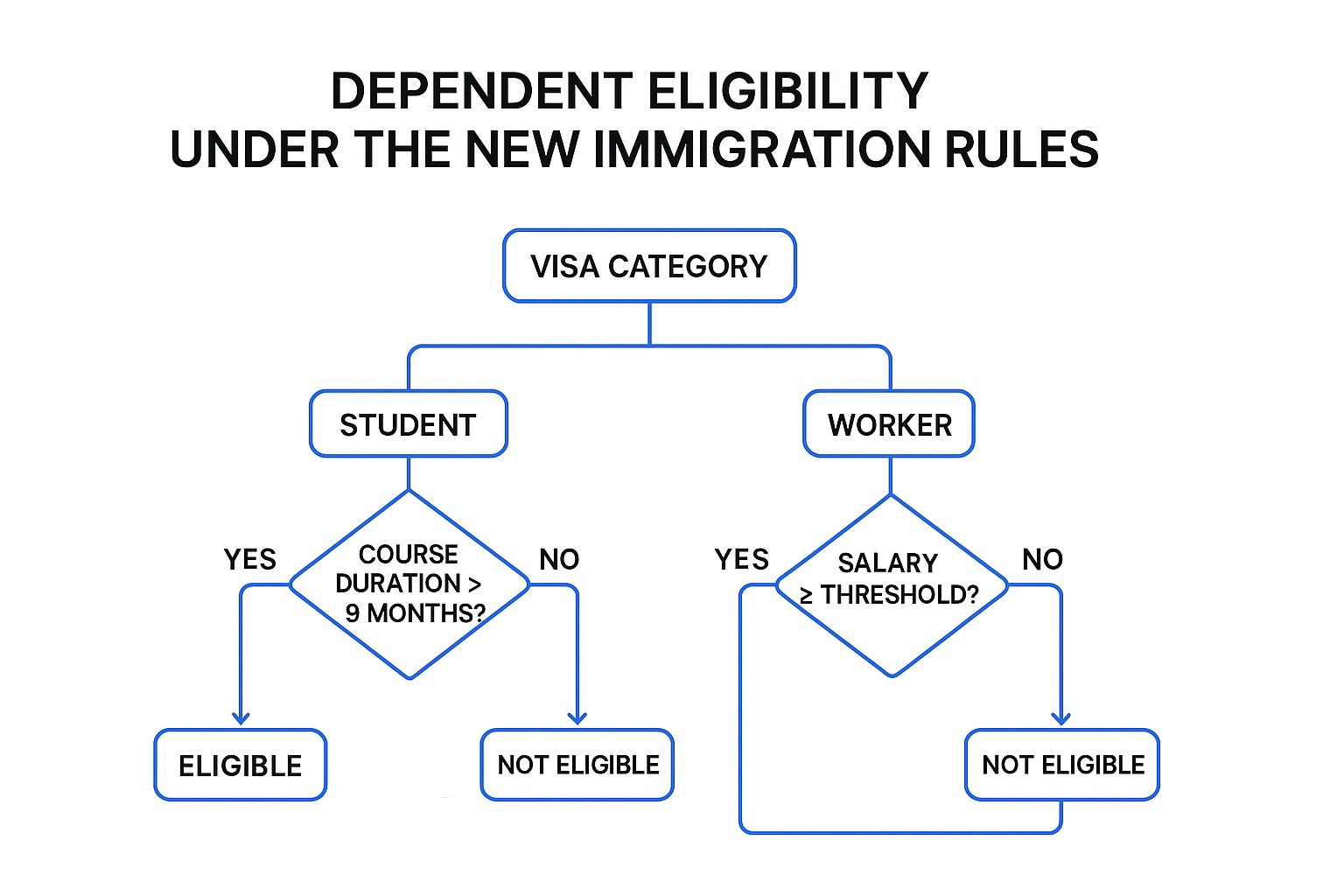New UK Immigration White Paper & Its Impact on Families of Students & Workers

When Everything Changed: Decoding The Immigration Shake-Up
Imagine training for a football match your whole life, only to show up on game day and be told the sport is now basketball. That’s the shock many Nigerian families experienced when the UK government suddenly changed its immigration rules. This wasn't a small adjustment; it was a fundamental rewrite of the playbook for anyone planning to work or study in Britain.
The path to a new life in the UK now comes with a much steeper climb. It's essential to understand the new UK immigration white paper and how it affects families of students and workers. These changes create real-world obstacles, so let’s unpack what has been altered.
What Exactly Is This White Paper?
Think of a white paper as the government's official blueprint for future policy. It’s a detailed report that lays out major plans for everyone to see. In this case, it’s the government revealing its new strategy for who can enter, work, and live in the country.
This specific plan outlines sweeping reforms aimed at significantly cutting net migration numbers. The new UK immigration white paper for 2025 raises the bar for skilled workers, increasing the minimum qualification from RQF level 3 (the equivalent of an A-level) to RQF level 6 (a university degree). It also pushes salary requirements much higher, making it financially difficult for people in many professions that were previously accessible. For many, the goalposts weren't just moved; they were put in an entirely different stadium. You can see the data driving these policy shifts in this detailed analysis from the Migration Observatory.
A Quick Look: Old Rules vs. New Rules
To really understand the magnitude of these changes, placing the old and new rules side-by-side makes the picture crystal clear. The following table compares the old and new immigration requirements, focusing on qualification levels, salary thresholds, and provisions for families.
| Requirement Type | Previous Policy | New Policy | Impact Level |
|---|---|---|---|
| Skilled Worker Skill Level | RQF Level 3 (A-Level Equiv.) | RQF Level 6 (Graduate Level) | High |
| Minimum Salary Threshold | Lower, with a shortage occupation list offering discounts | Significantly Higher, with a restricted shortage list | Very High |
| Student Dependents | Generally permitted for postgraduate students | Banned for most courses (exceptions for PhD) | Severe |
| Worker Dependents | Permitted if the main applicant met requirements | Stricter income requirements apply to the family unit | High |
The takeaway from this comparison is direct: the UK is becoming far more selective. Raising the required skill and salary levels is a deliberate move to attract only high-earning, highly-qualified individuals for work visas. As a result, many Nigerians who had a clear path under the old system now find their way blocked.
Perhaps the most difficult change is the new policy on dependents. It is now almost impossible for most international students to bring their spouses and children, forcing an agonizing choice between pursuing education and keeping their family together. These policies reflect a goal to lower overall migrant numbers. For a deeper dive, check out our guide on what every Nigerian should know about the new rules.
This abrupt shift has forced countless individuals and families to rethink their entire futures. It’s not just about more paperwork; it’s about facing new financial and personal hurdles, starting with the significant increase in required qualifications.
The Graduate Gatekeeping: Why Your Qualifications Just Got Scrutinized
Under the previous system, holding qualifications equivalent to A-levels was often enough to apply for a Skilled Worker visa. However, the goalposts have moved. The UK has raised the bar for entry, creating a new challenge for many aspiring Nigerians.
What Does RQF Level 6 Actually Mean?
Imagine the UK's Regulated Qualifications Framework (RQF) as a tall ladder, where each rung signifies a different educational milestone. Before, you only needed to reach RQF Level 3, which is comparable to having your WAEC or A-Levels. The new rules require you to climb all the way to RQF Level 6, the equivalent of a full Bachelor's degree.
This isn't just a minor adjustment; it's a significant leap up the ladder. This change effectively redefines what the government considers a "skilled" worker. It means many experienced professionals who have valuable hands-on skills and certifications but no university degree may now find themselves on the outside looking in. The underlying message is that a degree has become the new standard for most UK work visas.
The UK government offers a chart that visualizes these qualification levels.

As this breakdown illustrates, the jump from Level 3 to Level 6 is substantial, bypassing several intermediate qualifications and putting university graduates at the front of the line for the main skilled worker route.
Which Professions Are Hit Hardest?
This policy shift creates a ripple effect across numerous industries. For instance, a talented IT support technician with years of practical experience and industry certifications, but without a degree, could have qualified before. Under the new rules, they are likely ineligible.
The same applies to many roles in hospitality management, the creative arts, and skilled trades where experience has traditionally been valued more than a formal degree. The new UK immigration white paper and how it affects families of students and workers becomes starkly clear in these situations. If the primary applicant—say, a senior care worker with a vocational diploma—no longer qualifies, the entire family's dream of moving to the UK can fall apart.
Are There Any Workarounds?
There is a silver lining for those already in the UK on a Skilled Worker visa. You can still extend your visa or switch employers for roles that were eligible under the old rules. However, for anyone applying from overseas or changing from another visa category like the Graduate route, the stricter RQF Level 6 standard is mandatory.
The government has talked about a Temporary Shortage List for some roles falling between RQF levels 3 and 5. This is not a simple alternative. An occupation will only make it onto this list if there is a demonstrated, long-term shortage. Furthermore, employers will be under greater pressure to prioritize training UK-based workers. This path is restrictive and unpredictable, making it an unreliable option for most families planning their future.
Breaking Apart Student Families: The Dependent Dilemma Explained

While the new qualification requirements present a significant challenge, the changes to family visas are where these policies become deeply personal. For many Nigerians, pursuing an education in the UK was never just about a degree; it was a foundational step toward building a new life there with their family. This dream is now out of reach for thousands.
The Heartbreak of the 'No Dependents' Rule
The new rule is straightforward and stark: international students enrolled in most taught postgraduate courses are no longer permitted to bring their dependents—spouses, partners, or children—with them to the UK. It's like being handed a golden ticket to your future, but it's valid for one person only, forcing an impossible choice between a career-defining education and staying with your loved ones.
This is more than a simple inconvenience; it's a heart-wrenching decision that is causing many to abandon their UK ambitions entirely. This specific part of the new UK immigration white paper and how it affects families of students and workers has created tremendous stress, placing a heavy emotional and financial burden on families who had carefully planned their future together. For many, the "japa" dream now comes with an unbearable sacrifice.
The policy's effect was swift and severe. The number of student dependents arriving in the UK fell by 104,000 in the year after the change. This was not a slow trend but a sudden drop directly caused by the new restrictions, changing the very fabric of international student life in the UK. The Migration Observatory provides a detailed breakdown of these migration statistics, highlighting just how many families are now locked out of the UK study path.
Finding a Way Forward: Exceptions and Alternatives
Although the general rule is strict, there are a few key exceptions that allow some students to bring their families. Understanding if you fit into one of these specific categories is essential, as they offer a lifeline for a small group of applicants who meet precise criteria.
You may still be eligible to bring your family if you are one of the following:
- A new government-sponsored student embarking on a course that lasts longer than six months.
- Enrolled in a full-time postgraduate research programme, such as a PhD or another doctorate-level degree.
This is a critical distinction. The ban primarily impacts students on one-year taught Master's courses, which have been extremely popular among Nigerian applicants. However, for those pursuing research-based doctorates, the door for bringing dependents remains open, creating a clear divide. We explore these student-specific rules with more precision in our dedicated guide.
Faced with this new reality, families are having to think differently. Some are considering a difficult, phased approach where one partner studies alone, hoping the other can find an alternative route to join them later, such as a work visa. Others are now looking to countries with more welcoming policies for student families, like Canada or Australia. The dream of a better life abroad isn't over, but the journey to get there now requires difficult compromises and careful strategic planning, which we'll discuss next as we look at the growing financial pressures.
Salary Shock: When The Numbers Don't Add Up Anymore

While money has always been a key part of moving to a new country, recent UK immigration changes have turned it into the main event. Previously, many professionals could rely on the Shortage Occupation List, which acted like a special pass, allowing them to meet a lower salary requirement. That pass has now been revoked.
This single change dramatically reshapes the financial planning for anyone hoping to work in Britain. Jobs that once had a more manageable entry point now face the same high financial barrier as everyone else. The impact of the new UK immigration white paper and how it affects families of students and workers is starkly clear here, as one person's income now needs to stretch much further.
Breaking Down The New Financial Reality
Imagine that moving to the UK for certain essential jobs used to come with a significant discount on the "entry fee." That discount is now gone, and almost everyone is required to pay the full price. The general salary threshold for a Skilled Worker visa has jumped substantially, creating a difficult hurdle for many to clear.
This creates considerable pressure on you and on UK businesses, especially those outside of high-paying industries like finance and technology. For many positions, the new minimum salary is now higher than the typical market rate, posing a major recruitment challenge.
To better understand how these salary changes affect different professional sectors, the table below provides an analysis of typical pay ranges against the new government requirement.
Salary Threshold Impact by Profession
| Profession | Typical UK Salary Range | New Threshold | Feasibility Rating |
|---|---|---|---|
| IT Project Manager | £45,000 – £70,000 | £38,700 | High |
| Graphic Designer | £25,000 – £40,000 | £38,700 | Low-Medium |
| Marketing Executive | £28,000 – £45,000 | £38,700 | Medium |
| Civil Engineer | £35,000 – £60,000 | £38,700 | High |
The data shows that while high-paying technical and engineering roles may still be viable, creative and mid-level corporate positions now find themselves in a much tougher spot.
The Geographical Puzzle: Why Location Matters More Than Ever
This challenge is made even more complex by the fact that UK salaries vary widely from one region to another. A standard salary in London might be considered very high for the exact same job in Manchester or Cardiff. Yet, the visa salary threshold is a single, nationwide figure.
This policy creates a geographical squeeze, pushing skilled workers towards London and the South East, where wages are higher but so is the cost of living. An employer in the North of England might find it difficult to offer £38,700 for a role that the local market values at £32,000, even if you're the ideal candidate.
This regional gap means your chance of getting a visa could now hinge on securing a job in one of the UK’s most expensive cities. Success requires a keen awareness of these regional pay differences and strong negotiation. For a deeper dive, read our detailed guide on the new rules for workers.
Britain First: The Philosophy Behind The Fortress Mentality
The new salary requirements and qualification standards aren't just random hurdles. They are signs of a much deeper change in the UK's national outlook, shifting from an open, global hub to a more protected fortress. This is a deliberate realignment toward a ‘Britain First’ philosophy.
Think of it like a town that suddenly decides it will only hire its own residents for every job, from plumbing to software development. While this might strengthen the local workforce over time, it creates immediate issues if the most skilled plumber or developer happens to live one town over. This inward-looking perspective is the engine behind the new immigration rules.
What This 'Britain First' Approach Means in Practice
This philosophy directly shapes how UK companies are allowed to hire. The government is now actively pushing them to invest in training the domestic workforce instead of recruiting talent from overseas. For industries with critical skill shortages, like healthcare and technology, this poses a serious problem. They need experts today, not in five years when a new training program bears fruit.
This is why understanding the new UK immigration white paper and how it affects families of students and workers is so important. The 2025 white paper clearly states its intention to reduce the UK's reliance on international recruitment and compel employers to hire locally first. For professionals from Nigeria, this means even if you meet the steep new salary and skill criteria, your ability to bring your family is now under threat, as the government views reducing the number of dependents as a core part of cutting net migration. Discover more about this strategic shift here.
The Economic Ripple Effect
This inward-focused policy creates significant economic waves. Although the stated purpose is to increase local employment, many economists and business leaders fear it could backfire. By closing the door to a global talent pool, key industries may struggle to innovate and expand, which could slow down the entire economy. A company unable to find a specialist in data science, for example, might have to cancel a major project.
For you, this philosophical change rewrites the rules of the game. It is no longer enough to be qualified for a job. Now, you must find an employer who is both willing and able to work through a system that is actively designed to discourage them from hiring you. Visa processing times may become less predictable, and the types of roles available to international candidates could shrink. This new "fortress mentality" is a critical factor to weigh when deciding if the UK is the right place for your family’s future. The journey is now less about your qualifications and more about your resilience against a system that is becoming deliberately more restrictive.
Surviving The Storm: Real Families Share Their Adaptation Stories
Policy changes aren't just words on a page; they create real-world hurdles that force families to make difficult decisions. To truly understand how to move forward, we need to look at the people who are already finding clever ways to adapt. Their stories are more than just inspiring—they're practical roadmaps for resilience.
Take Ade and Funke, a couple from Lagos. He's a software engineer and she's a construction project manager. Their plan was straightforward: move to the UK together on a Skilled Worker visa. The new rules, however, created a serious problem. While Funke’s job was skilled, her salary wouldn't meet the new, much higher income requirement unless she found a job in London. Their shared dream hit a wall.
Instead of giving up, they changed their strategy. Ade, with skills in a higher-demand field, focused on getting a sponsored role first. Funke is now working toward an advanced certification to qualify for higher-paying positions. The plan is for her to join him on her own work visa in 12-18 months. Their story is a powerful lesson in staggered relocation.
Finding Opportunity in Unexpected Places
Then there is Chidinma, a pharmacist who wanted to pursue a Master's in Public Health in the UK. The new ban on bringing family members for most Master's courses meant she couldn't bring her husband and young son, which was a deal-breaker for her.
Refusing to abandon her goal, she dug deeper. Her research uncovered a vital detail: some postgraduate diplomas in Scotland can be extended into a Master's degree. She found a program where the final stage was classified as research-based, which made her eligible to bring her family. Her experience shows that understanding the fine print and regional variations can open doors that appear to be closed. The new uk immigration white paper and how it affects families of students and workers makes this level of detailed investigation essential.
These personal struggles are unfolding against a backdrop of wider economic pressures in the UK, a situation frequently highlighted in the daily news.
This economic climate adds another layer of financial strain on families who are already facing the challenges of these strict new immigration policies.
Actionable Lessons from Their Journeys
These families didn’t find a magic solution; they relied on smart strategy and good information. Their experiences offer a practical guide for others in a similar position.
- Stagger Your Relocation: Don't feel pressured for everyone to move at once. The partner with the stronger application can go first, creating a more stable foundation and easing the financial load for the other to follow.
- Explore Devolved Nations: Opportunities and rules can vary in Scotland, Wales, and Northern Ireland. Look into career and education paths in these regions, as you might find unique exceptions.
- Focus on High-Demand Skills: Be proactive about upskilling in fields that easily meet the new salary thresholds. Target industries where there are known skill shortages.
- Look Beyond Taught Master's: If bringing your family is a top priority, investigate PhDs or other research-based postgraduate programs, as many still allow you to bring dependents.
These stories show that while the new rules present a significant challenge, the determination of families to build a future is a powerful force. They prove that a policy paper doesn't have to be the final chapter.
Your Family's Roadmap: Strategic Planning For The New Reality
Knowing the rules have changed is one thing; figuring out your family’s next move is something else entirely. This isn't about finding loopholes, but about building a smart, realistic plan that works within the new system to give your family the best chance of success. It’s time to move from understanding the challenges to creating clear, practical steps for your family's "japa" journey.
Building Your New Game Plan
Think of the UK immigration landscape as a new map. The main highway you planned to take may now have tolls or restrictions, but other scenic routes and smaller roads can still get you to your destination. Your first step is an honest look at your family's combined strengths. Who has a qualification that meets the RQF Level 6 standard? Whose job can realistically meet the new, higher salary threshold, particularly if you’re looking outside London?
Success now often depends on smart timing. For many families, this could mean a staggered approach. Imagine one partner, the one with the strongest application, going ahead as a "scout" to establish a base in the UK. Once settled, they can pave the way for the rest of the family to join through another visa route. This strategy requires patience, but it can turn a firm "no" into a hopeful "not yet."
While the Skilled Worker and Student visas are the most common, they are not the only paths. The recent changes make it crucial to explore all available options. The table below compares a few alternative routes that still offer provisions for families.
Table of Alternative Visa Pathways for Families
Comparison of different visa routes still available to families affected by the new restrictions
| Visa Type | Family Provisions | Requirements | Processing Time | Success Rate |
|---|---|---|---|---|
| Health and Care Worker Visa | Dependents (partner, children) are permitted. | Must have a job offer from an approved UK employer in an eligible health or social care role. Lower salary threshold applies. | Typically 3 weeks from outside the UK. | High, provided job offer and eligibility are met. |
| Global Talent Visa | Dependents (partner, children) are permitted. | No job offer or salary threshold. Requires endorsement from a recognized UK body as a leader or potential leader in your field. | Around 3-8 weeks for endorsement and visa decision. | Varies by applicant profile and strength of endorsement. |
| Student Visa (Postgraduate Research) | Dependents are permitted for students on a PhD or other doctorate-level course, or a research-based higher degree. | Must be accepted into an eligible postgraduate research program. | Usually 3 weeks from outside the UK. | High, with a valid Confirmation of Acceptance for Studies (CAS). |
| Innovator Founder Visa | Dependents (partner, children) are permitted. | Must have an innovative, viable, and scalable business idea supported by an endorsing body. | Around 3 weeks from outside the UK. | Moderate; heavily dependent on the business plan and endorsement. |
This comparison shows that specialised routes remain open for families with specific skills or qualifications. Your unique professional or academic background could be the key to a successful move, even with the new restrictions in place.
Decision Frameworks for Tough Choices
Making these life-changing decisions means weighing difficult options. The new UK immigration white paper and how it affects families of students and workers requires you to be clear about your top priorities. Is the main goal to move together immediately, or is it for one person to secure a key career opportunity that will build a stronger foundation for the future?
This decision tree gives a clear, visual breakdown of the new eligibility checks for bringing family members.

As the infographic shows, the path has become simpler but stricter. For workers, income is the new gatekeeper. For students, the type of course you're studying is what matters most. Understanding these core factors helps you focus your efforts where they count. To build your own strategy, consider these steps:
- Take a Family Skills Inventory: List every family member's qualifications, work experience, and realistic potential salary in the UK.
- Explore Every Avenue: Look beyond the standard routes. Could a Global Talent, Health and Care, or another niche visa be a better fit for your family's profile?
- Map Out Your Finances: Calculate the real costs for different timelines. If you choose a staggered approach, can your budget handle a period of separation?
- Get Expert, Reliable Guidance: Avoid relying on hearsay from social media groups. Use verified tools and professional advice to plan your steps with accuracy.
A successful plan in this new environment is built on solid, current information and a clear-eyed view of your options.
Ready to build a smart, personalized plan for your UK journey? JapaChat is Nigeria’s first AI immigration expert, designed to give you instant, clear answers and help you map out your best path forward. Start planning with confidence today at JapaChat.com.

Leave a Reply